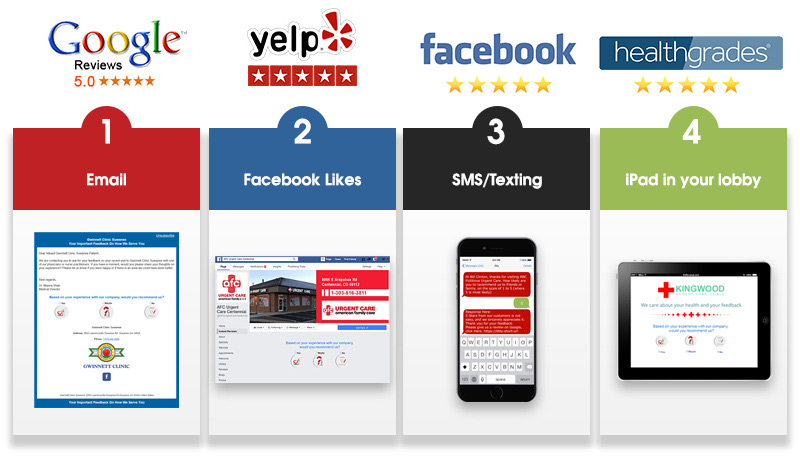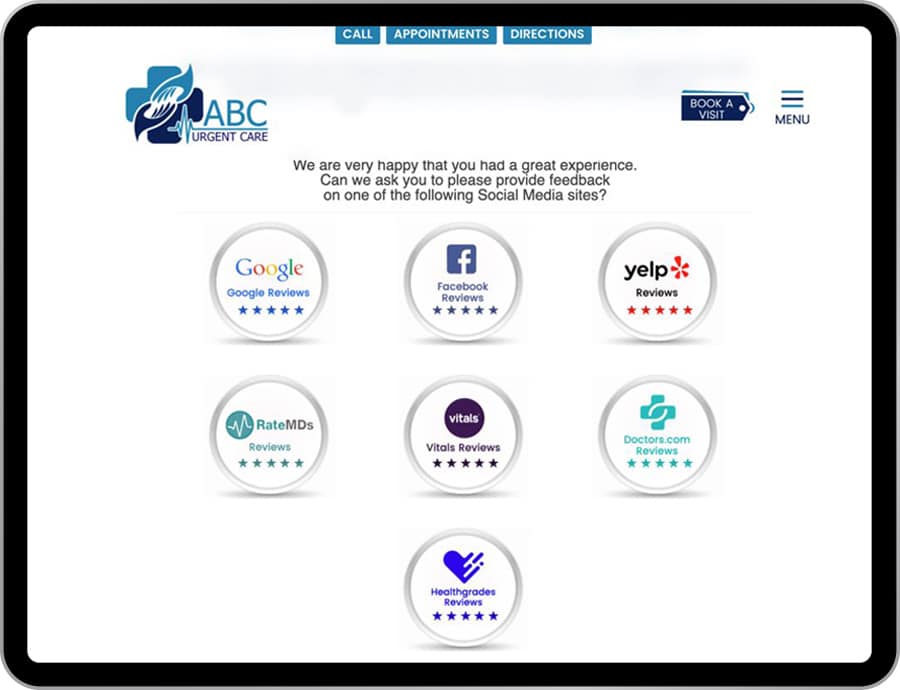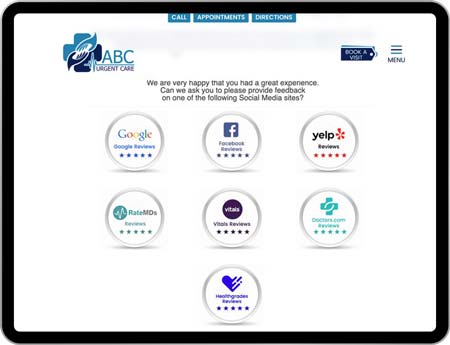HIPAA Compliant Healthcare Practice Reputation Management Apps $399/mon
Simple Pricing All 3 Apps for $399/mon. HIPAA Compliant. No Setup Costs.
Introduction from PatientGain and experience from 10+ Years:
Google Reviews is the most influential review site for attracting new patients and engaging existing ones. Facebook and Yelp reviews are also important, but less so than Google Reviews. For Google Reviews, the target rating should be 4.5 to 4.9 with at least 100 reviews. For Yelp reviews, the target rating should be 4.2 or higher with at least 50 reviews. Achieving these review targets can significantly improve patient acquisition and engagement. Over 70% of patients/clients for medical practices check online reviews before choosing a provider, and from these patients/clients, only 72% choose doctors with 4-star reviews or higher. If you have 5.0 reviews, patients/clients do not believe these overall ratings. Basically it is human to make mistakes, but overall are you focused on providing good and reliable service?
Real world data: A practice with a 4.9-star rating from 100 Google reviews will almost always get more new patients compared to a practice with a 4.1-star rating from 30 Google reviews.

3 Strategies to Improve Online Reputation Management For Doctors
No 1. Use an iPad in the lobby for patient reviews.
No 2. Use Text/SMS based software for patient reviews.
No 3. Use Email Marketing based software for patient reviews.


In a perfect world, the quality of the medical care and level of personal attention provided by you should be enough to ensure that your patients contribute glowing reviews and testimonials. Of course, the reality is that most patients need to be gently and subtly encouraged to submit any online feedback. According to Pew Research, Most patients in U.S. have high praise for their health care providers, however patients still post negative reviews even if there is a billing issue or other non-physician related issues.
In real life, maximizing positive online review and minimizing negative reviews should be your strategy.
Here is an example for a customer using PatientGain Reputation Apps.
Week 1: Strategy reviewed with the project manager – Google Reviews identified as the most important review site
Week 1: Apps setup for customer & training of the new customer
Week 2: EMR connector and Auto-Loader used to import data from existing EMR – There are over 10,000 patients in the EMR. However only 3289 patients had Emails. PatientGain.com system cleans duplicates, fixes spelling mistakes automatically. Ran PatientGain.com app to create a list of all GMAIL Patients. Used List Splitter to create multiple smaller lists to avoid detection of “Sudden Bursts” of Positive Reviews
Week 2: 250 Requests sent
Week 3: 6 new reviews – Five 5-star reviews generated One 4-star.
Week 3: Next 250 Requests sent
Over the next 11 weeks 27 total new reviews generated. Total rankings improved from 3.1 stars to 4.3 stars.
Reputation Management Data For Medical Practices and Doctors
At PatientGain.com we have achieved great success for our healthcare customers. We have also learned that success rule of 80/20 still applies in online reputation for doctors and clinics. There are hundreds of online reputation sites. More than 80% of your success is likely to come from Google Reviews . Other review sites are still useful to your clinic’s online strategy, but much less so than Google reviews.
So what should be your strategy for reputation management for your medical practice? Should you have simple apps that allow to capture reviews from patients as they are about to leave your practice? Should you send them surveys? Unfortunately these techniques may work on a limited number of reputation sites, but the most important reputation sites, Google and Yelp, their algorithms are likely to filter or blacklist your patient reviews if they are all being submitted from the same computer, same IP address, or same location. It is easy to track originating reviews and testimonials. So if it’s too easy, it is likely to have an adverse effect on your reputation, rather than increasing your reputation. Unfortunately there are no short cuts.
How to Ask for Testimonials and Reviews From Your Patients
When you want to bring new patients to your medical practice, your online reputation is an important consideration when people research your location. When shopping around for services, people move in groups and are less likely to choose a location that has scant online reviews compared to a location that has a lot of customer feedback. You can use your online reputation to your advantage to bring in new patients, who will then leave their reviews. If approached correctly, this self-feeding loop of reviews and testimonials will give your clinic a significant marketing advantage.
Reputation management solution built for healthcare.
- Trust starts in the search bar. Dominate Google’s local search rankings with higher ratings and more recent reviews across all your providers and location listings.
- Increase patient volume by 30% with more 5-star reviews from real patients.
- Feature your best reviews as testimonials on your website and social media channels.
Asking for patient testimonials and reviews is a crucial step in building trust, credibility, and attracting new patients. Here are some effective strategies to help you collect valuable feedback:
1. Direct Approach
- Verbal Request: Politely ask satisfied patients if they would be willing to leave a review. This can be done in person or over the phone at the end of a successful visit.
- Written Request: Send a handwritten note or personalized email expressing gratitude for their care and kindly requesting a review. A personal touch can make patients feel valued.
2. Leverage Technology
- Patient Portal: Include a link to review platforms within your patient portal or after-care instructions.
- Email Campaigns: Send targeted emails asking for feedback after appointments. You can set up automated follow-up emails thanking patients and requesting reviews.
- Text Messages: Send brief text messages with a link to review sites. Make sure to keep it simple and direct, with a clear call-to-action.
3. Offer Incentives / This has to be done with care
- Small Rewards: Consider offering small incentives like discounts on future services or complimentary add-ons. This can motivate patients to leave a review, but ensure it remains ethical.
- Raffles and Contests: Run a contest where patients can win prizes for leaving a review. For example, enter all reviewers into a monthly drawing for a gift card or free service.
4. Make It Easy
- Provide Links: Include direct links to your review platforms in your emails, text messages, and patient portal to streamline the process for your patients.
- Simplify the Process: Make the review process as easy as possible by providing clear instructions and making the review form as quick as possible for your patients.
5. Respond to Reviews
- Thank Positive Reviews: Always express gratitude for positive feedback. A simple “thank you” goes a long way in building patient loyalty.
- Address Negative Reviews: Respond promptly and professionally to negative reviews, offering solutions or an apology if appropriate. This shows potential patients that you care about feedback and patient satisfaction.
Scenario: A Client Leaves a 1-Star Review Online
A client leaves a negative review about their experience, claiming they didn’t see results from a treatment. You’re worried this could harm your reputation.
- Solution: Implement an online reputation management strategy.
- Respond promptly and professionally to the review, saying:“We’re sorry to hear about your experience. Client satisfaction is our top priority, and we’d love to make this right. Please contact us at [phone/email] so we can discuss your concerns.”
- Encourage satisfied clients to leave positive reviews to outweigh the negative one.
- Use PatientGain’s app to send automated review requests to clients after treatments.
- Outcome: The dissatisfied client updates their review to a 4-star rating after their concerns are addressed. Meanwhile, your average Google rating improves from 3.8 to 4.5 stars due to the influx of positive reviews.
6. Follow-Up
- Check-in: Send a follow-up email or text message to remind patients to leave a review if they haven’t already.
- Offer Assistance: If a patient is hesitant to leave a review, offer to help them write one, or guide them through the process.
7. Best Practices
- Be Honest and Transparent: Avoid asking for only positive reviews. Encourage honest feedback, both positive and constructive.
- Respectful and Ethical: Ensure you are adhering to ethical guidelines, especially around incentivizing reviews. Never offer incentives for only positive reviews or manipulate feedback.
- Patient Privacy: Always prioritize patient privacy and confidentiality when collecting and using patient information.
By implementing these strategies, you can effectively collect patient testimonials and reviews that can significantly impact your online reputation, build trust with potential patients, and help your practice grow.
How and why should I ask for reviews or testimonials?
A review or testimonial is a 1st person witness about how great of service they received at your clinic. Some of the most potent commercials on TV are ones featuring actual customers with the label “not an actor” underneath them. Let your most satisfied customers do the talking for you. They have the first-hand experience and are willing to tell others! These reviews and testimonials can be easily tacked onto your website. In most cases, they are short and to the point. They can also be used in print or email marketing materials.
Is it hard to get a review or testimonial?
If you have never formally asked for a review or testimonial in an organized fashion, it may seem like an impossible task. However, it is a lot easier than you may think. The most critical part: Asking. Still, timing is a key factor. The best moment is when your patient has been treated, and you have over delivered your service to them, leaving a patient feeling better, informed, and confident about their health.
How do I ask for a review on a site like Google, Facebook, or Yelp?
Reviews on these websites are often some of the first things a new patient will see when considering your clinic for your services. However, this is also where unhappy patients will leave their feedback, regardless if it is a valid critique of your business. Don’t let a single bad review make you sigh away from this powerful marketing tool. Patients widely recognize today that every business, be it a medical clinic, auto repair, or a pretzel stand will get bad reviews every now and again. The key is to build a vast repository of good reviews. All you need to do is ask.
To get as many reviews as possible, you need to make the process as easy as possible. The fewer clicks a patient has to do, the more likely they will follow through and leave you that review. No one wants to spend 5 minutes detailing their visit. You want to make it easy for someone to leave five stars, say a few words, and be on their way with the option to leave more detailed feedback if they choose.
Why does a patient leave me a negative review?
When a patient leaves a negative review of your medical clinic, more often than not, it has nothing to do with your doctor. In fact, studies indicate only about 28% of negative reviews are related to a patient’s interaction with a doctor. The other 72% often deal with billing issues, incorrect deductible payment, wait time, problems with a front desk worker or other staff, or improper handling of paperwork.
Patients will leave your medical clinic either happy, unhappy, or somewhere in the middle. With some focus on your end and combined with our excellent software, you can build a winning marketing strategy leveraging your patient’s experience. Unhappy and disgruntled patients leaving negative reviews can destroy a doctor and a clinic’s reputation. Proactively addressing problems, whether real or perceived, is the strategy you should adopt to protect your business.
How can I get positive reviews for my clinic?
The lobby of your facility isn’t just a place for a patient to wait to be seen by a doctor. It is a GOLD MINE for reviews for your business. Putting a little work into a patient’s departure can harvest great reviews from happy patients on their way out the door. Our reputation app works on iPads and is user-friendly. Once implemented, this easy to use app will start producing results in the first week at most clinics.
Your reputation on Google is, by far the single most crucial marketing strategy you should implement. While Facebook and Yelp are essential to keep in mind, a vast majority of people will start with Google first. Google Search produces excellent results for healthcare clinics, and within those results, the number of reviews is a powerful visual for potential patients.
What is the best strategy to get reviews or testimonials from patients? Should I use text (SMS) based, email, or ask for them in my waiting room?
The truth is, you should adopt all of these strategies. Using only one approach can cause reviews to be flagged. For example, if you send out a mass email or text(SMS) asking for reviews, you will get a “burst” of reviews to your profiles. Text-based review requests often only produce a rating without any comments. The algorithms in these review sites will start blocking these reviews. By adopting all of these strategies, it will send a varying amount of reviews of different length and times throughout the week to your profile.
How do I get positive reviews for doctors at my clinic?
Ideally, the level of attention and quality of medical care should be enough to get patients to leave a positive review or testimonial. In reality, most patients need to be gently encouraged to leave feedback, which is why a strategy to acquire these reviews is vital for a medical practice. You should have a plan in place to maximize positive reviews and minimize negative reviews.
What review sites should I concentrate on?
At PatientGain.com, we’ve found our healthcare customers have had great success by focusing on Google and Yelp. You should expect an 80/20 ratio for reviews from these two sites. 80% or more of your reviews will come from Google, and the rest will likely come from Yelp. There are other healthcare centric review sites out there and should be kept in mind for your online strategy, but they are not as important as these two review sites.
How can I learn more about reviews, testimonials, and how to acquire them at my medical practice?
PatientGain.com has spent years working with a variety of healthcare clients in many different fields of medicine. Our powerful software has produced excellent results across the country. Make an appointment today to speak with our experts today and let us show you the difference PatientGain.com can make at your clinic.
